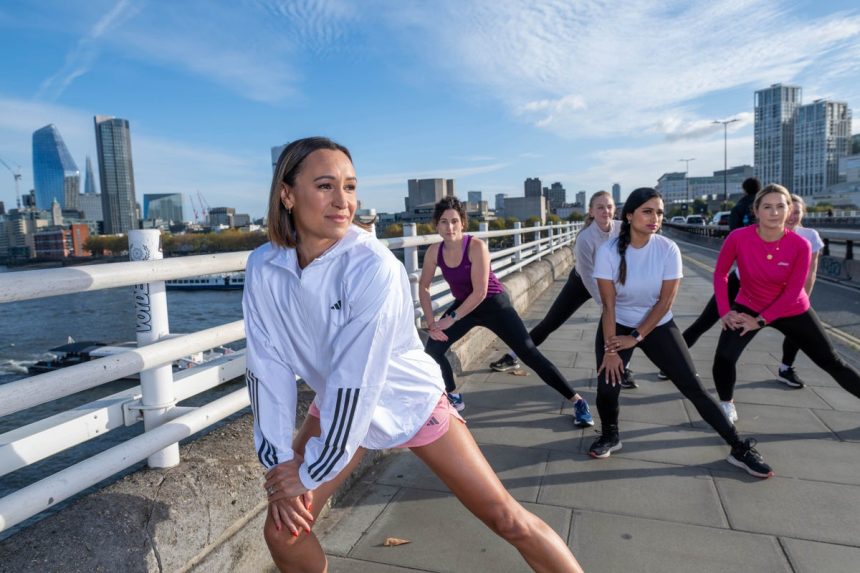Your support helps us to tell the story
From reproductive rights to climate change to Big Tech, The Independent is on the ground when the story is developing. Whether it’s investigating the financials of Elon Musk’s pro-Trump PAC or producing our latest documentary, ‘The A Word’, which shines a light on the American women fighting for reproductive rights, we know how important it is to parse out the facts from the messaging.
At such a critical moment in US history, we need reporters on the ground. Your donation allows us to keep sending journalists to speak to both sides of the story.
The Independent is trusted by Americans across the entire political spectrum. And unlike many other quality news outlets, we choose not to lock Americans out of our reporting and analysis with paywalls. We believe quality journalism should be available to everyone, paid for by those who can afford it.
Your support makes all the difference.
Dame Jessica Ennis-Hill wants us all to feel a bit more empowered to tell our bosses we need to fit exercise into our working days.
“If you’re fit and healthy, and exercising, I think it has a massive positive effect on your energy levels at work, how productive you are and your focus,” says the former heptathlete-turned sports broadcaster and entrepreneur.
Research by Vitality has found that 69% of women under the age of 50 say demanding work schedules impact their ability to exercise, and a third (36%) across all ages report feeling guilty about taking time to exercise.
Ennis-Hill, who won Olympic gold and silver, and was three-time world champion, says for women in particular, prioritising exercise can be really hard. “It’s the juggle. So many women are trying to do so many things at the same time. I think a lot falls on women at home.”
So what’s her advice for allowing fitness to take up more space in your life?
1. Reframe exercise as essential
“It’s looking after yourself,” says Ennis-Hill, whether that’s around your home life or work. “And you can’t be the best version of yourself for you or anyone else if you’re not taking those small steps to help you. Physically, you feel better when you’ve exercised, but also mentally, the endorphins and the headspace it gives you is such a positive thing.”
Feeling guilty for taking an hour out of the day to exercise is very common, especially amongst women, she adds. “Whether it’s ‘I should be doing something with the kids’ or, ‘I should be working’, ‘I should be doing all these other things’ – you see it as a treat.
“I think you have to reframe the way you look at it – it gives you so much. It energises you, it refocuses you. I think a lot of women look at it as a guilty pleasure.”
2. Do short bursts
“Sneak in little snippets of exercise,” recommends the mum-of-two. “I think often you feel, for it to be worthwhile, you have to do an hour’s session at the gym, or go on an hour’s run.
“Actually, I personally find that doing small windows of exercise, 10 or 15 minutes, half an hour max, you can push yourself quite hard, you can get a sweat on, it makes a big difference to how you feel.”
The former athlete, who retired in 2016, says she doesn’t train for hours on end. “I might have a long run at the weekend but during the week, I’ll just sneak in a little loop or theraband exercise session – 10 minutes – and then I might go on the bike for half an hour during the week. I try and have a bit of a schedule.”
She recommends HIIT circuits using your own bodyweight as resistance. “Put together four or five exercises to go through, 30 seconds on each, have a short break, and then go through the rounds again – do that three or four times.
“That’ll work you pretty hard. You can work all the muscle groups through your body.”
3. Don’t put it off
“Sometimes you’ve just got to not procrastinate too much – just grab your trainers, get out and just do it,” Ennis-Hill says.
It’s “so easy” to put it off, she adds, “then you spend an hour thinking about what you’re going to do and when you’re going to do it, and you don’t actually do it.”
4. If you’re at home for the day – dress in workout gear
Ennis Hill says she wears workout clothes a lot at home – “much to my husband’s annoyance,” she laughs.
“Because you never know! It makes a big difference just being ready to go. If you’re sat on a call, a call finishes early, and you’ve got a bit of spare time, then you’re ready to go, aren’t you? You’re not faffing about trying to get changed, and in that time, you can change your mind very quickly. It definitely helps to be on standby, ready to go.
“It’s hard when the weather’s terrible and it’s dark – everybody finds it hard. But having good equipment, like a great pair of trainers, really helps you want to go out and train,” she adds.
5. Start small with your goals
“Set realistic goals for yourself. [If] you set yourself five challenges, it’s so hard to maintain all of them. And I think once something falls by the wayside, then it has a bit of a domino effect. So set yourself one or two things maximum that you want to achieve, and don’t be hard on yourself, just keep chipping away.”
Add an extra session a week, and build up gradually, she suggests. “That will help you have a more sustained way of exercising.
“As an athlete, that’s what we’d always do. We’d never just throw ourselves in at the deep end. You have to get your body used to it, and then you feel good about yourself as you feel yourself getting stronger and fitter. And that’s really rewarding.”
6. Listen to your body
Feeling flat and unmotivated? “Be kind to yourself,” says Ennis Hill. “You might not feel like a hard yoga session on that particular day, that’s fine, listen to your body, adapt what you’re going to do, something that’s more appropriate to how you’re feeling.”
Plus, “Understand that your motivation is going to change” over different weeks, months of year, and even times of the month.
For women, our bodies are “changing all the time” throughout different stages of hormonal cycles and different life stages. If you can recognise the patterns in the way your body changes and the way you move, and what works for you at different times, “that can be really powerful in helping you keep motivated”, Ennis-Hill says.
“Generally speaking, if you’re in your follicular phase [of your hormonal cycle], you’re more likely to feel more positive, more energetic and ready to do a session – they’re the times where you might want to push yourself a bit, or add more strength or resistance training, because you’re more likely to reap the benefits, as opposed to doing it at other phases of your cycle.”
7. Give yourself a pep talk
“When I was an athlete I’d always say, ‘The rest of the world are training really hard’,” says Ennis-Hill.
“Now it’s a little bit different, because I’m not competing with the rest of the world, but I say to myself, ‘I know I don’t feel like doing it, but I know that feeling after I’ve exercised is going to be so worthwhile, I know how energised I feel after it. So even if I’m feeling really tired and not feel like doing a session, I know that after I’ll feel a million times better.”
Jessica Ennis-Hill and Vitality are encouraging women to ‘Walk Out to Work Out’, urging them to reclaim pockets of their day for physical activity.







